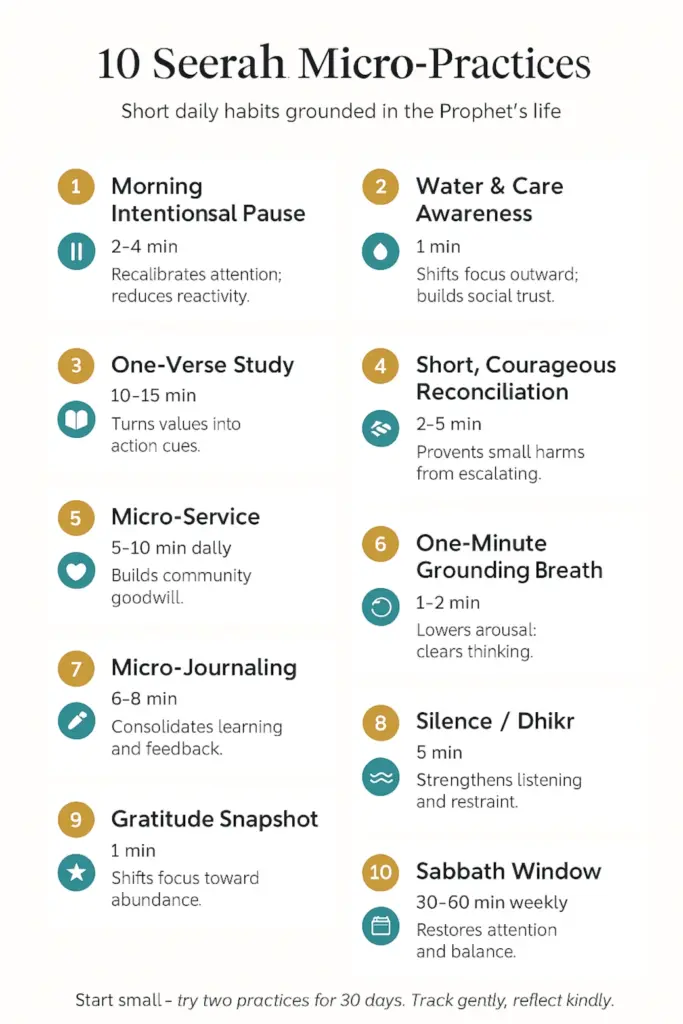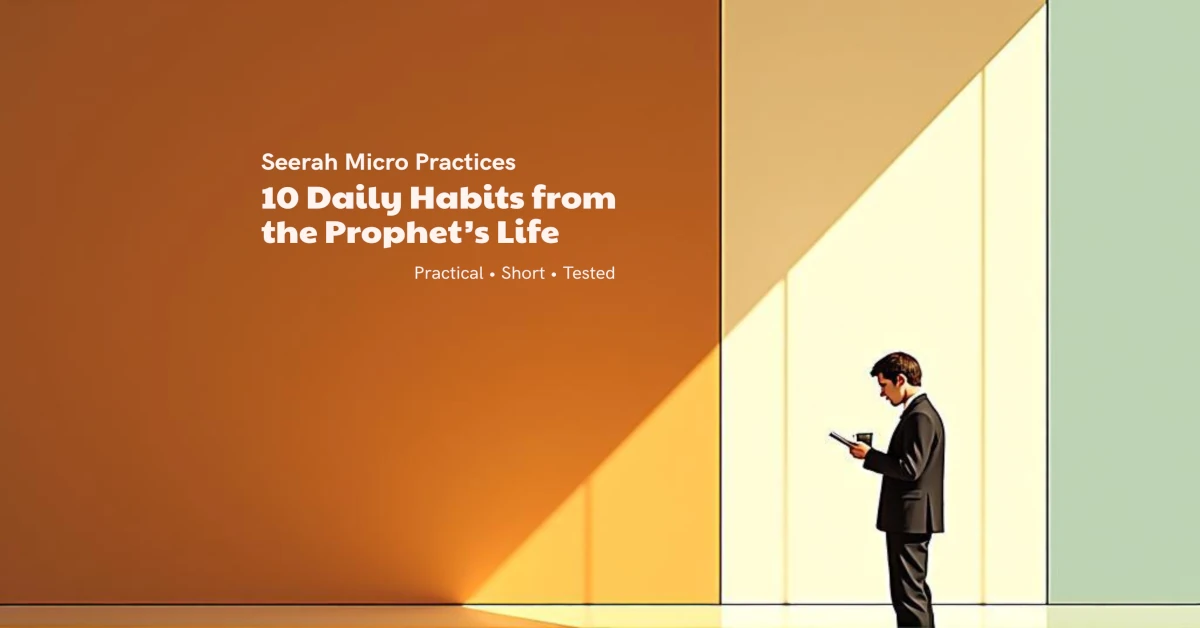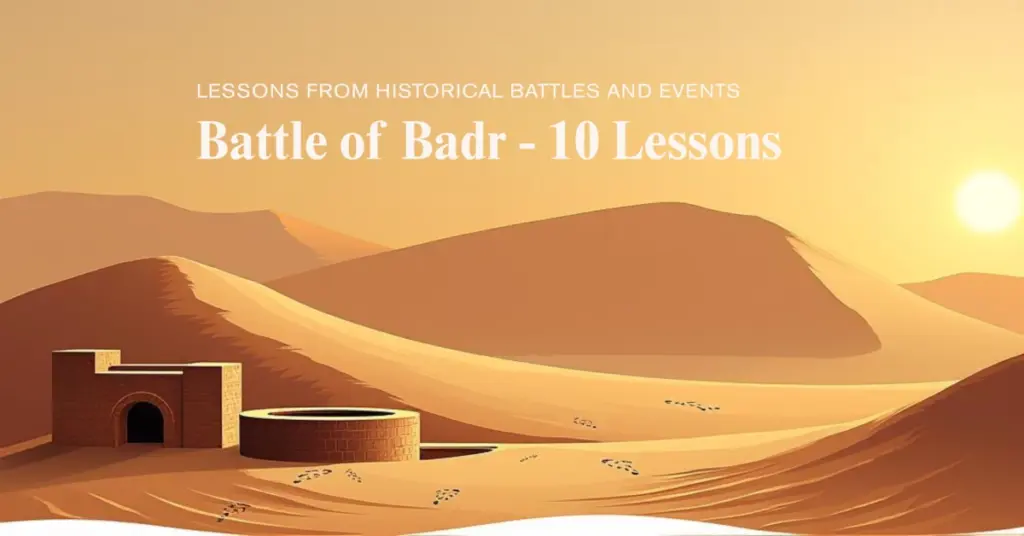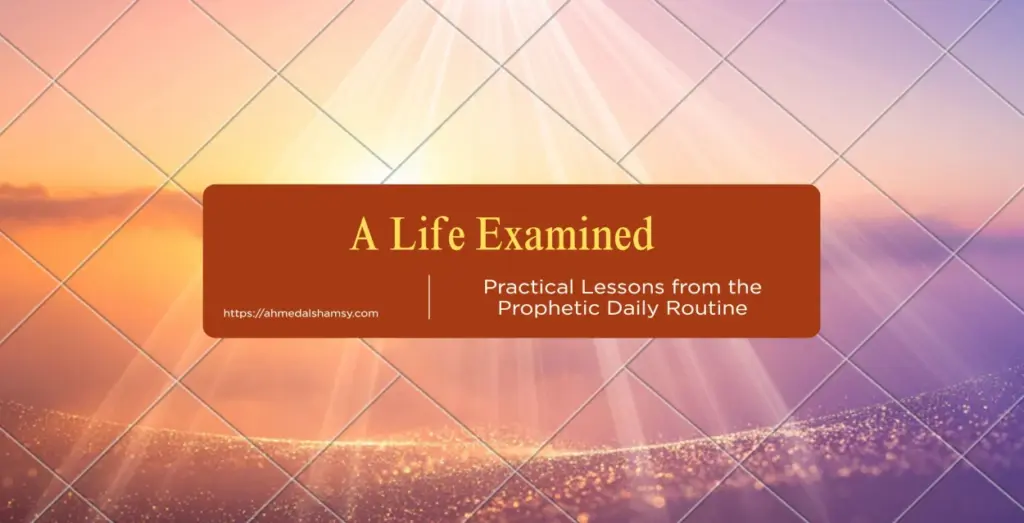AIM — Free & Open
CC BY-NC-SAAIM is free and open for non-commercial reuse. Try a free AIM pilot (CSV + memo) — support is optional and helps sustain translations, research, and free access.
You wake to three unread messages, a news alert, and a calendar that already feels full — by 9 a.m. you feel squeezed, reactive, and small decisions feel heavy. Imagine instead beginning the same day with a two-minute pause that clears the fog, focuses one moral choice, and reduces reactivity for hours. That – Seerah Micro Practices – was the everyday edge the Prophet’s small routines afforded his community; translated into micro-practices, those same tiny acts can protect attention, build steady courage, and produce durable communal trust. 1
Seerah Micro Practices guide translates ten historically grounded Seerah moments into practical micro-practices you can use daily. Each practice includes (a) a short Seerah anchor, (b) a concise “why this works” sentence tying the history to a psychological or spiritual benefit, (c) a 1–4 minute daily script, (d) a weekly deepening, and (e) a study prompt for groups. Use two to three practices for 30 days, track progress compassionately, and adapt for plural settings. 2
Table of Contents
Introduction: Seerah Micro Practices

Seerah micro practices translate the Prophet’s everyday habits into practical, bite-sized routines you can use now. Try two or three: a two-minute morning pause, a one-verse reflection, and a one-minute grounding breath. These tiny, historically grounded actions strengthen attention, reduce reactivity, and build communal trust over weeks. Track gently, adapt for diverse groups, and treat the practices as experiments rather than obligations. Start small, and notice deep, steady changes soon.
This – Seerah Micro Practices guide – is a practical workbook you can read straight through or use as a reference card. Pick 2–3 practices to try for 30 days, log simple progress (days kept and felt resilience), and reconvene with a small circle to reflect. The “why” line with each practice links the historical example to modern evidence about attention, habit formation, social trust, or moral repair. 3
Where I make historical claims about the Seerah or hadith narratives I add a reference number that points to the References section below. These are guideposts — consult the listed works for fuller reading. The Seerah Micro Practices are intentionally flexible for readers of diverse backgrounds.
10 Daily Habits from the Prophet’s Life to Build Spiritual Resilience

Micro-Practice 1 — Morning Intentional Pause (2–4 minutes)
Seerah anchor: – Seerah Micro Practices – The Prophet began many days with brief acts of remembrance and orientation that framed priorities for the day. 4
Why it helps (one sentence): A very short morning ritual recalibrates attention and reduces cognitive reactivity, making moral choices more deliberate. 5
Daily script (2–4 minutes): Before reaching for your phone: sit up, inhale 4 seconds, exhale 6, and say quietly: “Today I will notice when I react and choose patience.” State one concrete aim aloud (e.g., “I will offer a kind word to one person”). 6
Weekly deepening (15–20 minutes): Write a single paragraph on how daily intentions altered small decisions. Keep the paragraph private or share with a trusted pairing partner. 7
Study prompt: How did communal time-markers (prayer, gathering) in Medina provide scaffolding for personal discipline? 8
Micro-Practice 2 — Water & Care Awareness (1 minute)
Seerah anchor: – Seerah Micro Practices – The Prophet emphasized hospitality and practical care for travelers and the thirsty as moral duties. 9
Why it helps (one sentence): Brief acts of mindful care shift attention from inward worry to outward service — a cognitive reframe that reduces rumination and builds social trust. 10
Daily script (1 minute): Before a meal or drink, breathe and think: “Who might be thirsty today?” Perform a small outward act (text a neighbor, sponsor a cup of water to a local drive). 11
Weekly deepening (10–30 minutes): Volunteer at a food bank or arrange a neighborhood drop-off. 12
Study prompt: What small acts of hospitality in the Seerah created reputational trust that facilitated wider cooperation? 13
Micro-Practice 3 — One-Verse Study (10–15 minutes)
Seerah anchor: – Seerah Micro Practices – Scriptural passages were integrated into daily life through short readings and reflection. 14
Why it helps (one sentence): Focused textual reflection translates abstract values into concrete action cues, strengthening moral clarity under pressure. 15
Daily script (10–15 minutes): Read a single short verse slowly. Ask: (1) What does this ask of me today? (2) What small action could this prompt? (3) Who benefits if I act? Record one sentence. 16
Weekly deepening (30–45 minutes): Compare two brief classical readings (a lines-long tafsir each) and note differences in practical takeaway. 17
Study prompt: How do brief readings change community norms differently than long lectures? 18
Micro-Practice 4 — Short, Courageous Reconciliation (2–5 minutes)
Seerah anchor: – Seerah Micro Practices – The Prophet modelled swift reconciliation—offering words of repair and preferring restoration over public shaming. 19
Why it helps (one sentence): Fast, humble repair reduces relational entropy and prevents small harms from cascading into long feuds. 20
Daily script (2–5 minutes): If you caused an upset, send: “I want to check in; if I upset you earlier I’m sorry. Can we talk?” 21
Weekly deepening (15 minutes): Inventory unresolved tensions; plan one restorative gesture. 22
Study prompt: Compare reactions to conflict in the Seerah and locate principles that support restorative outcomes. 23
Micro-Practice 5 — Micro-Service (5–10 minutes daily; one larger weekly)
Seerah anchor: – Seerah Micro Practices – Frequent small services—helping, carrying, visiting—were ordinary modes of life and social glue. 24
Why it helps (one sentence): Repeated small services create measurable social capital that buffers communities in crises. 25
Daily script (5–10 minutes): Offer a small, practical help: carry an item, send an encouraging note, or assist a colleague with a short task.
Weekly deepening (1–2 hours): Coordinate a mutual-aid action (deliver groceries, tutor a child).
Study prompt: How did many tiny acts of service accumulate into durable communal trust?
Micro-Practice 6 — One-Minute Grounding Breath (1–2 minutes)
Seerah anchor: – Seerah Micro Practices – Hadith literature records the Prophet’s calm presence and counsel in tense moments, modelling steadiness.
Why it helps (one sentence): Brief regulated breathing reduces physiological arousal, enabling clearer thinking and fewer reactive words.
Daily script (1–2 minutes): In stress: inhale 4 — hold 2 — exhale 6 — repeat three times while silently repeating “steady, present” or a short dhikr.
Weekly deepening (10–15 minutes): Try a guided breathwork or mindful walk.
Study prompt: How does embodied calm in leaders influence follower behavior in crisis?
Micro-Practice 7 — Micro-Journaling (6–8 minutes)
Seerah anchor: – Seerah Micro Practices – Companions preserved short teachings and reflections that circulated as practical memory aids.
Why it helps (one sentence): Brief recorded reflection consolidates learning and promotes iterative improvement in moral habits.
Daily script (6–8 minutes): Fill three fields: (1) Today I learned X; (2) Small win Y; (3) Next step Z.
Weekly deepening (30–45 minutes): Synthesize weekly entries into a one-sentence lesson to share or keep.
Study prompt: How did the preservation of short lessons help communal memory in the early movement?
Micro-Practice 8 — Silence or Dhikr (5 minutes)
Seerah anchor: – Seerah Micro Practices – The Prophet recommended moments of remembrance and recognized the moral discipline of silence.
Why it helps (one sentence): Deliberate silence or focused repetition reduces impulsive speech and increases reflective listening.
Daily script (5 minutes): Sit quietly and repeat a short phrase (e.g., SubḥānAllāh) or a neutral contemplative phrase, observing thoughts without judgement.
Weekly deepening (20–30 minutes): Attend a guided reflection or contemplative reading.
Study prompt: What social functions did regular remembrance and silence serve in the community?
Micro-Practice 9 — Gratitude Snapshot (1 minute)
Seerah anchor: – Seerah Micro Practices – Public and private expressions of thanks are frequent in early texts, reinforcing communal appreciation.
Why it helps (one sentence): Naming small gratitudes shifts cognitive focus from scarcity to abundance, improving well-being and prosocial approaches.
Daily script (1 minute): Name aloud one small thing you’re grateful for and why; optionally send a brief thank-you to someone.
Weekly deepening (10 minutes): Write a gratitude paragraph and, where safe, express it to someone.
Study prompt: How did gratitude rituals reinforce group solidarity historically?
Micro-Practice 10 — Sabbath Window (30–60 minutes weekly)
Seerah anchor: – Seerah Micro Practices – Periodic retreats and night vigils reset communal energy; the movement created institutional pauses that mattered.
Why it helps (one sentence): A weekly restorative window protects attention capacity and supports mental restoration — a necessary counterbalance to constant busyness.
Weekly script (30–60 minutes): Pick a weekly window — screens off — read, walk, pray, or converse quietly. Treat it as an intentional reset.
Weekly deepening: Convert one reflection into a concrete action for the coming week.
Study prompt: How do communal pauses contribute to movement longevity and ethical formation?
Way to track progress

– Seerah Micro Practices – Tracking and reflection:
- Consistency: How many days did I practice this week? (tick box, not scoreboard).
- Felt steadiness: A simple 1–5 self-rating at week’s end — “How steady did I feel?”
- Small wins log: One sentence per week: “This micro-practice helped me X.”
Track to notice patterns — not to shame. Use the tracking data as companionship evidence rather than a productivity metric.
Case study
– Seerah Micro Practices – Amina’s eight-week experiment:
Amina, a mid-career teacher, felt constant friction between work demands and family obligations. She tried three micro-practices for eight weeks: Morning Intentional Pause, One-Verse Study, and Micro-Journaling. Week 1 she missed days; by week 2 she stacked the pause on making tea (habit stacking) and practiced the one-minute breath before parent meetings. After four weeks she noticed less reactivity when a student interrupted and wrote a short note in her journal each evening recording one small compassionate act.
By week 6 her weekly “felt steadiness” rose from 2 to 4 (self-rated) and she had three instances where a quick reconciliation message defused a tense parent exchange. The group she shared with swapped two short resources weekly and reported better follow-through on community help tasks. Amina’s story shows how small choices compound: micro-habits protected attention, created space for repair, and increased both private well-being and public trust.
Why this matters: Small, consistent wins create self-evidence: the Seerah Micro Practices make new behavior feel normal and then habitual.
Workshop & study group suggestions
90-minute workshop outline: warmup (10), teach 5 practices from Seerah Micro Practices and do paired practice (40), roleplay reconciliation & service (25), planning (15). Use the tracking sheet above and encourage opt-in sharing.
Study prompt pack: use the single-verse practice from Seerah Micro Practices as a focal text for each month and pair it with one micro-practice as fieldwork. Share reflections at month’s end.
Integrating Micro-Practices into Community Life
While micro-practices often feel deeply personal, they can also transform the collective rhythm of a community when applied with consistency. Seerah Micro Practices show that: The Prophet ﷺ reminded his companions that faith flourishes most when believers support each other in simple but intentional ways. A smile, a word of encouragement, or a short duʿāʾ (supplication) for someone’s wellbeing are all small acts that ripple outward and strengthen resilience at the group level. These gestures reduce feelings of isolation, especially for Muslims navigating modern workplaces or interfaith circles where they may feel their faith identity is underrepresented.
One practical step from Seerah Micro Practices is to establish “micro-habits of remembrance” within families or local communities. For example, beginning gatherings with a brief verse of Qur’an or ending with a single collective prayer helps anchor the moment in spirituality without overwhelming participants. This mirrors how the Prophet ﷺ encouraged companions to exchange salām and short prayers regularly—rituals that both uplift the heart and weave a culture of mutual care.
In professional or interfaith settings, these Seerah Micro Practices can become bridges of empathy. A Muslim who pauses before responding to a difficult question, drawing from the practice of sabr (patience), demonstrates not only inner discipline but also communicates respect to others in dialogue. Similarly, practicing shukr (gratitude) by publicly acknowledging shared values builds trust with non-Muslim colleagues or neighbors. These actions embody the Prophetic ethos: guiding with gentleness while remaining firm in faith.
Ultimately, embedding micro-practices in community life ensures they outlast fleeting motivation. They shift spirituality from being an individual pursuit into a shared rhythm, where faith is strengthened by collective support. As the Seerah shows, the Prophet ﷺ nurtured resilient communities not through monumental acts but through repeated, consistent habits that shaped hearts and relationships over time.
Final reflections — humility and iteration
– Seerah Micro Practices – The Seerah is not a time capsule of identical practices for every modern life; it is a repository of patterns. Micro-practices make those patterns testable and teachable: small things done repeatedly change who we are, our relationships, and how communities sustain themselves. – Seerah Micro Practices – Start small, track gently, and treat your group as a laboratory of care rather than a scoreboard of perfection.
FAQs
I’m not Muslim — is this for me?
Q: I’m not Muslim — is this for me?
Yes. Each practice from Seerah Micro Practices is structural (pause → act → reflect). Replace explicitly religious phrases with secular equivalents (e.g., a brief mindful phrase instead of dhikr) while keeping the same timing and action. Emphasize consent and optionality when teaching mixed groups.
I slipped for a week — now what?
Treat slip as data: reduce targets, revisit anchors, restart with compassion.
How can a small group measure whether the practices are working together?
Use simple shared metrics: weekly check-ins with a 1–5 “felt steadiness” score, a one-sentence small-wins log, and one short example of how a practice prevented or repaired conflict. Share results as learning, not judgement, and use them to adapt the next 6-week plan.
Are these practices meant to replace formal worship or spiritual disciplines?
No — they’re complementary. Micro-practices are short routines that support attention, patience, and community life. They help sustain the energy and intention that make deeper spiritual practices or formal worship easier and more meaningful.
What’s a simple, non-judgmental way to track progress?
Use three gentle indicators: (1) consistency — tick boxes for days practiced; (2) felt steadiness — weekly 1–5 self-rating; (3) one small-win sentence each week. Track to notice patterns, not to punish slips.
How do I introduce these practices in a mixed or public setting?
Frame them as optional experiments, ask for consent before group exercises, offer secular alternatives, and invite sharing but never require participation. Keep language invitational: “Would you like to try this for 30 days?”
What if a practice feels too time-consuming or I keep missing days?
Shrink the practice (e.g., 1 minute instead of 5), stack it onto an existing habit (e.g., after making tea), and restart with compassion. Consistency wins over intensity — small repeated actions are the goal.
Is there any risk of these practices becoming performative?
Yes—if they’re done only for appearance, they lose depth. Guard against performativity by keeping private logs, inviting honest reflection, and prioritizing internal shifts (felt steadiness, relationship repair) over outward metrics.
How can families or teachers adapt these practices for children and teens?
Shorten times (30–60 seconds), use playful prompts (one gratitude sentence, a “pause bell”), model the habit openly, and make sharing voluntary. Use stories from the Seerah as age-appropriate prompts to link practice with real-life examples.
References
- Armstrong, Karen. Muhammad: A Prophet for Our Time. HarperOne, 2006.
Link: (publisher page) ↩︎ - Donner, Fred M. Muhammad and the Believers: At the Origins of Islam. Belknap Press / Harvard University Press, 2010. (Harvard University Press) ↩︎
- Fogg, B. J. Tiny Habits: The Small Changes That Change Everything. Houghton Mifflin Harcourt, 2019. (Amazon) ↩︎
- Ibn Isḥāq (as preserved/edited by Ibn Hishām) — The Life of Muhammad: A Translation of Isḥāq’s Sīrat Rasūl Allāh (trans. Alfred Guillaume). Oxford University Press (English translation eds./reprints 1955 / 1998). (archive / Oxford listing) ↩︎
- Fincham, G. W., Strauss, C., Montero-Marín, J., & Cavanagh, K. “Effect of breathwork on stress and mental health: a meta-analysis of randomized-controlled trials.” Scientific Reports, 2023;13:432. (nature) ↩︎
- Ma, X., et al. “The effect of diaphragmatic breathing on attention, negative affect and cortisol response to stress.” Frontiers in Psychology, 2017. (Frontiers) ↩︎
- Pennebaker, James W. Opening Up: The Healing Power of Expressing Emotions. Guilford Press, 1997. (Foundational work on expressive writing and reflective journaling.) (publisher) ↩︎
- Watt, W. Montgomery. Muhammad: Prophet and Statesman. Oxford University Press (original ed. 1961; various reprints). (archive) ↩︎
- al-Mubārakpūrī, Safī-ur-Rāẖmān. Ar-Raheeq al-Makhtum (The Sealed Nectar): Biography of the Prophet. Darussalam, revised English ed., 2002. (Amazon) ↩︎
- The Study Quran — Nasr, Seyyed Hossein (ed.). The Study Quran: A New Translation and Commentary. HarperOne, 2015 (English ed. 2017). (Goodreads) ↩︎
- Sahīh al-Bukhārī (selected hadiths) — standard English collections/translations (e.g., Muhammad Muhsin Khan or M. M. Pickthall online listings). (searchable hadith corpus). ↩︎
- Donner, Fred M. (again useful here) — Muhammad and the Believers for community formation; see also Donner’s articles on early pacts and group consolidation (2010). (Harvard University Press) ↩︎
- Encyclopaedia of Islam / Brill — entry overviews for treaties, asylum-clause and tribal customs (see Brill Online: “Hudaybiyya / Hudaybiyyah” and related entries). (Subscription resource; Brill is the reference.) (Brill Encyclopaedia) ↩︎
- Zehr, Howard. The Little Book of Restorative Justice. Good Books, 2002. (Accessible short primer on restorative principles.) (Publisher) ↩︎
- Mauss, Marcel; or more modern social-capital and hospitality studies — representative: Putnam, Robert D. Bowling Alone: The Collapse and Revival of American Community. Simon & Schuster, 2000 (useful for social-capital framing). (Simon & Schuster) ↩︎
- Research on prosocial acts and reduced rumination — Representative review: Lyubomirsky, Sheldon; et al., research on prosocial behavior and well-being (see review articles on prosociality and mental health). ↩︎
- Volunteer coordination & mutual-aid manuals — practical resources such as Volunteer Management handbooks used by NGOs. Representative resource: Points of Light / Volunteer Management Guides (online practical materials). (US NGO hub with practical guides) ↩︎
- Tafsir primers for one-verse study — recommended accessible commentary: Ibn Kathīr, Tafsīr Ibn Kathīr (selected English translations), or Seyyed Hossein Nasr (ed.), The Study Quran (see #11 above). ↩︎
- Cognitive science on focused reading → action translation — representative: Kross, Ethan, and E. J. Dweck lines? (For an accessible synthesis: James Clear (Atomic Habits) and Fogg (Tiny Habits) cover habit translation from cues/reads to action; see #3–#4.) ↩︎
- Breathwork and short contemplative practice evidence — meta-analyses and reviews (see #6 and #7 above). Representative review: Khoury, B., et al., Mindfulness-based therapy: A comprehensive meta-analysis. Clinical Psychology Review, 2013. (Scientific Reports 2023): ↩︎
- Reflective journaling research (expressive writing & positive journaling) — Smyth, J. (overview) and systematic reviews: Smyth, J. M., & Pennebaker, J. W. articles; see: Online Positive Affect Journaling Improves Well-Being (Smyth et al., 2018). ↩︎
- Restorative justice handbooks / practice guides — see Zehr (2002) (#15) and: Bazemore, G. & Umbreit, M., Balanced and Restorative Justice, 1995 (practice materials). ↩︎
- Sources on prophetic examples of reconciliation and clemency — classical Seerah collections and accessible modern readings: Ibn Isḥāq / Ibn Kathīr / al-Tabarī (see #5 and next entries). For modern synthesis: Karen Armstrong (2006) and Watt (1961). (Internet Archive) ↩︎
- Micro-service practice historical accounts — primary Seerah narratives (Ibn Ishaq / Ibn Hisham / Ibn Kathir) and secondary syntheses (Al-Mubārakpūrī, Donner). See #5, #10, #2. ↩︎
- Practical guides for measurement and gentle tracking — examples: Designing for Behavior Change (Soman) and simple community evaluation guides such as the M&E toolkits from NGOs and civic programs (e.g., Nesta or local philanthropy toolkits). Representative link: Nesta resources on measurement for small civic programs. ↩︎
Discover more from Ahmed Alshamsy
Subscribe to get the latest posts sent to your email.







